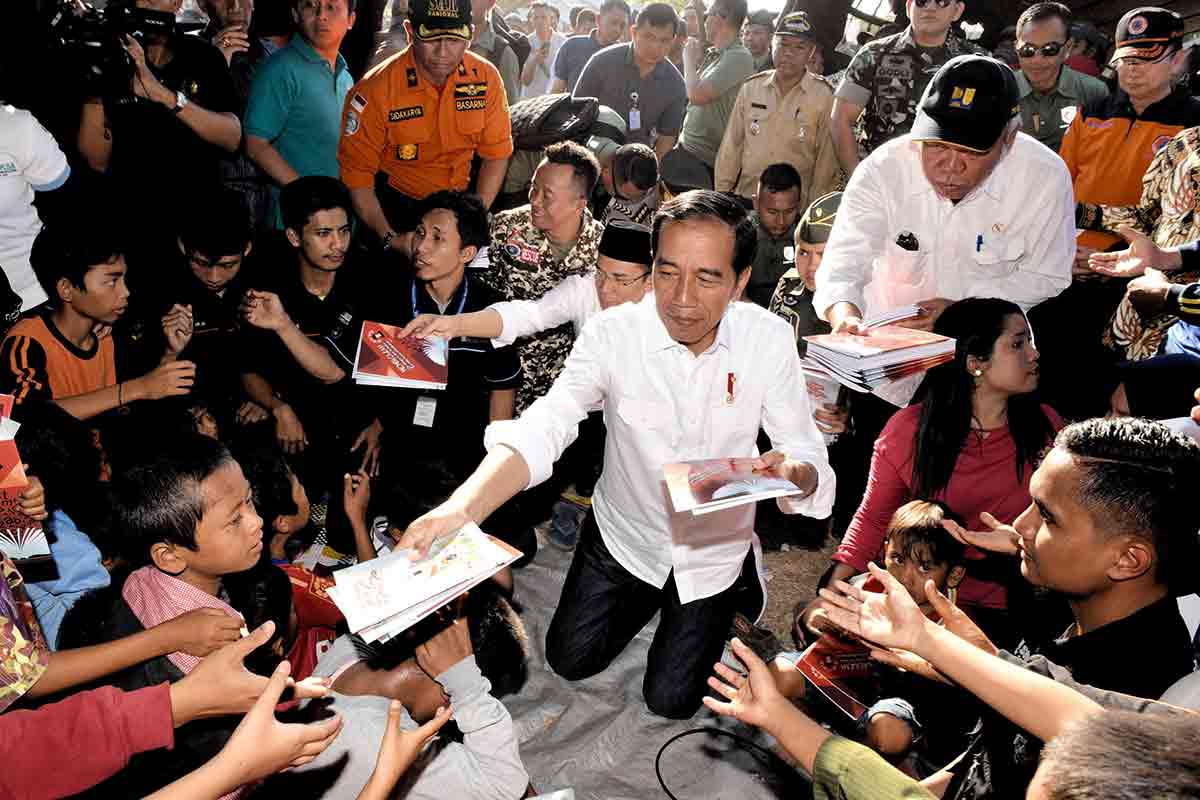Indonesian President Joko Widodo has picked Ma’ruf Amin, the head of the nation’s influential clerics’ council, as his running mate for next year’s election, setting the stage for a rerun of the 2014 race with former general Prabowo Subianto.
Amin was chosen for his vast experience in religious and political affairs and the pair will file their nominations on Friday, Widodo, known as Jokowi, told reporters in Jakarta on Thursday. The duo will fight Subianto, who leads Indonesia’s main opposition party Gerindra, and is paired with incumbent Jakarta Deputy Governor Sandiaga Uno.
Jokowi’s choice of the 75-year-old cleric from the nation’s most influential Muslim organization will bolster his re-election prospects and can thwart potential attempts by the opposition to sway voters on religious grounds. Jokowi enjoys a considerable lead in opinion polls and partnering Amin may help him to build on the margin among the country’s more conservative Muslim voters.
“By choosing a religious figure, Jokowi wants to minimize any race, ethnicity and religion-based issues,” said Arya Fernandes, an analyst at Center for Strategic and International Studies in Jakarta. “Jokowi has concerns over issues related to identity.”
The Jakarta governor election last year was marred by sectarian tensions and mass street protests, which saw Anies Baswedan and Uno, who were backed by Subianto, emerging winners. The incumbent Basuki Tjahaja Purnama, known as Ahok, a Jokowi ally, was later jailed after being found guilty of blasphemy.
Islamic organization
Amin is an Islamic scholar and heads the Indonesian Ulema Council. He is also the chairman of the advisory council of Nahdlatul Ulama, the country’s largest Islamic organization with about 140 million members.
Jokowi has gained endorsements from at least six major parties, including his Indonesian Democratic Party of Struggle and former ruling party Golkar. The 57-year-old has worked hard at maintaining an image as the “people’s president” that helped catapult him to the top job. His alliance also controls more than 60 percent of parliament.
While the nominations close on Friday, official campaigning will begin in September with voting scheduled for April 17.
Economy focus
Indonesia’s economy has expanded at about five percent under Jokowi with the unemployment rate falling to a two-decade low. The president has also been praised for a massive infrastructure program and reform agenda that’s helped secure sovereign rating upgrades and much-needed investment.
Jokowi said he would focus on developing Indonesia in “an equitable and just” way if elected again. Calling Amin a wise religious leader, Jokowi said his running mate’s experience as a legislator and his role as an adviser to the president will complement his own strength.
Indonesia, the fourth-most populous country with 262 million people, is also home to the world’s largest Muslim population. But the country has more than 25 million living in poverty, according to the World Bank.
The Subianto-Uno pair pledged to work for more equal distribution of wealth, creation of jobs, and to ensure affordable food prices while accelerating the nation’s development.
Outsider
Jokowi, the first president to come from outside the political elite or the military, has often faced questions about his Islamic credentials. Days before the 2014 election, Jokowi made a dash to the holy city of Mecca after he fended off allegations over his religion and ethnicity during the campaign. That’s something he would have considered while picking Amin.
“The biggest flaw of Jokowi is the perception about him that he’s anti-Islam,” said Achmad Sukarsono, a Singapore-based analyst at Control Risks. “By picking Amin, Jokowi is showing that he’s a Muslim and fighting for the interest of Muslims. By doing that, he hopes to secure Muslim votes.”
Jokowi’s choice of a cleric may also be lauded by investors as they won’t need to worry about religious and ethnicity issues, which were often a distraction for the president while pursuing economic reforms, according to Lana Soelistianingsih, chief economist of Samuel Sekuritas.
"Jokowi’s economic platform won’t change that much,” Soelistianingsih said. “Investors may well appreciate Ma’ruf if he’s able to address religious and ethnicity issues that have worried them all this time. This will create stability, something that investors long for.” - Bloomberg
